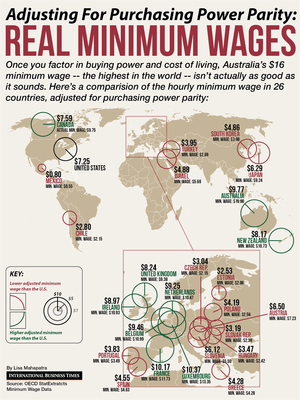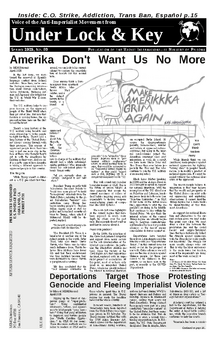
Raise the Minimum Wage to $2.50

Even using PPP to adjust minimum wages, all countries in this
graphic
except for Mexico have minimum wages that are at least an
order of
magnitude higher than those in the poorest countries.
In 2014 the minimum wage will be going up in many states. Leading the way are Washington($9.32) and Oregon($9.10), with New York making the biggest jump to $8.00 per hour. New York City was center to the recent fast food strikes. Meanwhile, Democrats in Congress have plans for a bill this year that would raise the federal minimum from $7.25 to $10.10 per hour.(2)
Another place that minimum wage struggles made a lot of noise in 2013 was the garment industry in Bangladesh. As we mentioned in the last issue of Under Lock & Key, those workers had a recent victory in the minimum wage being raised from $38 to $68 per month. In Cambodia, garment workers have been promised a raise in the minimum wage from $80 to $95 per month. Unsatisfied, the workers have joined recent protests against the current regime to demand $160 per month.(3)
With 48-hour work weeks, garment workers are making around $0.35 per hour in Bangladesh, and $0.42 in Cambodia. Believe it or not, these are the privileged workers who have special protections because they are in important export industries. The common Bangladeshi has a minimum wage of $19 per month, which is less than 10 cents an hour.
The proposed $10 per hour minimum in the United $tates would put the lowest paid Amerikans at ONE HUNDRED times the income of the lowest paid workers in Bangladesh. This is why on May Day we called out the chauvinist white worker movement for skirting the issue of a global minimum wage.
Now, the first cry of our chauvinist critics will be “cost of living, you forgot about cost of living.” Our proposal for a global minimum wage would tie this wage to a basket of goods. That means the worker in the United $tates and the worker in Bangladesh can afford comparable lifestyles with their pay. Maybe the Amerikan gets wheat where the Bangladeshi gets rice, for example. But the Amerikan does not get a persynal SUV with unlimited gasoline, while the Bangladeshi gets bus fare to and from work. To maintain such inequality the Bangladeshi is subsidizing a higher standard of living for the Amerikan.
It happens that the World Bank has taken a stab at this calculation with their Purchasing Power Parity. Using this calculation, the minimum wage in Bangladesh, which appears to be $0.09 per hour, is really a whopping $0.19 per hour.(4) So, we must apologize to our critics. The proposed minimum wage of $10 per hour would only put the lowest paid Amerikans at 50 times the pay of the lowest paid Bangladeshi if we account for cost of living.
Recently the New Afrikan Black Panther Party (Prison Chapter) accused our movement of dismissing the possibility of revolutionary organzing in the United $tates because we acknowledge the facts above. Just because struggles for higher wages, and other economic demands, are generally pro-imperialist in this country does not mean that we cannot organize here. But revolutionary organizing must not rally the petty bourgeoisie for more money at the expense of the global proletariat. Besides, even in the earliest days of the Russian proletariat Lenin had criticisms of struggles for higher wages.
While we expressed doubts about Chokwe Lumumba’s electoral strategy in Jackson, Mississippi, we remain optimistic about the New Afrikan Liberation Movement’s efforts to mobilize the masses there. Organizing for cooperative economics and self-sufficiency is a more neutral approach to mobilizing the lower segments of New Afrika than the SEIU clamoring for more wages for unproductive service work. While our concerns rested in their ability to organize in a way that was really independent of the existing system, creating dual power, the SEIU’s begging for more spoils from the imperialists does not even offer such a possibility. To really address the inequalities in the world though, we must ultimately come into conflict with the capitalist system that creates and requires those inequalities.
One agitational point of the fast food protests has been that 52 percent of the families of front-line fast food workers need to rely on public assistance programs.(1) One reason this is true is that most fast food workers do not get to work 48 or even 40 hours a week. Throw children and other dependents in the mix and you have a small, but significant, underclass in the United $tates that struggles with things like food, rent and utility bills. Most are single parents, mostly single mothers. Collective living and economic structures could (and do) serve this class and can offer a means of political mobilization. The Black Panthers’ Serve the People programs and Black houses (collective living) are one model for such organizing. But state-sponsored programs and the general increase in wealth since the 1960s makes distinguishing such work from working with imperialism a more daunting task.
The campaign for a global minimum wage has little traction among the lower paid workers in the United $tates, because they do not stand to benefit from this. This is a campaign to be led by the Third World and pushed through international bodies such as the World Trade Organization. We support it for agitational reasons, but don’t expect mass support in this country. It allows us to draw a line between those who are true internationalists and those who are not.(5)
Any campaign working for economic interests of people in the imperialist countries is going to be problematic because the best economic deal for them will require teaming up with the imperialists, at least for the forseeable future.








